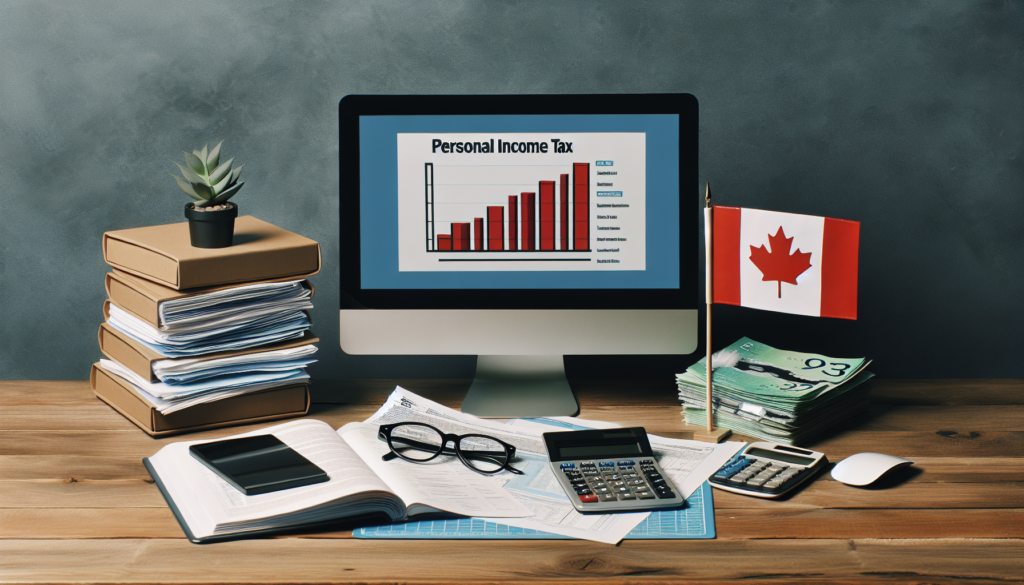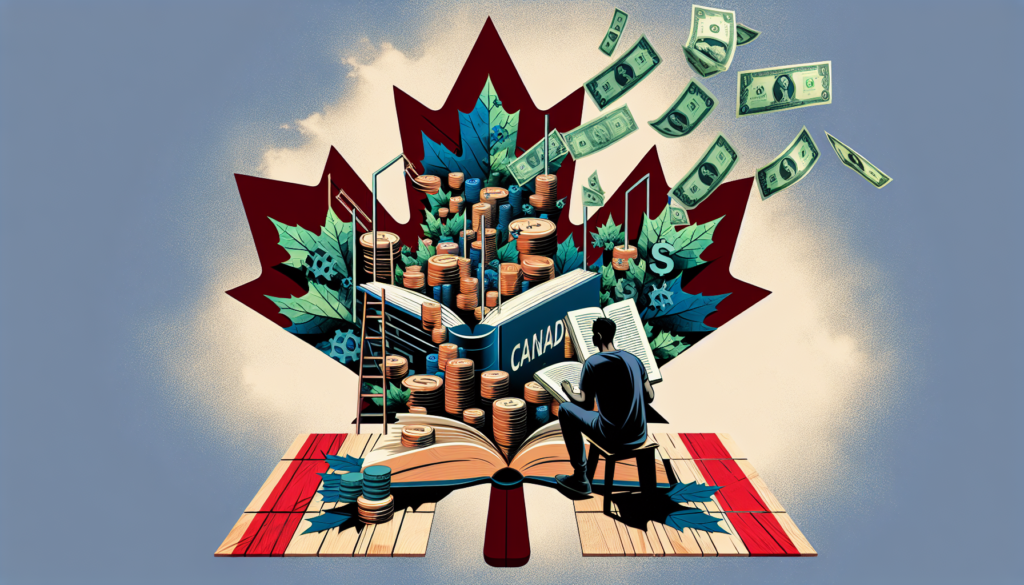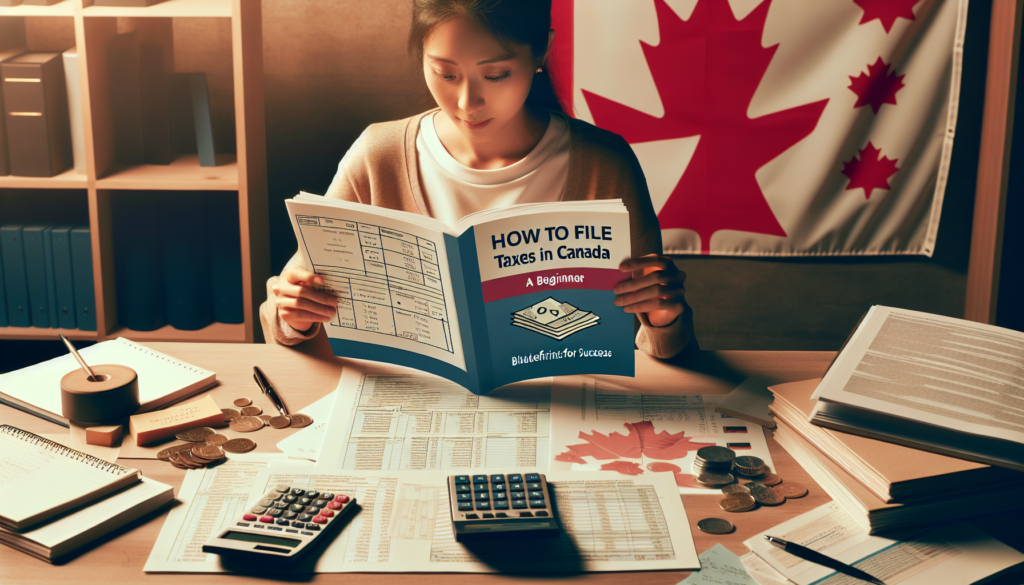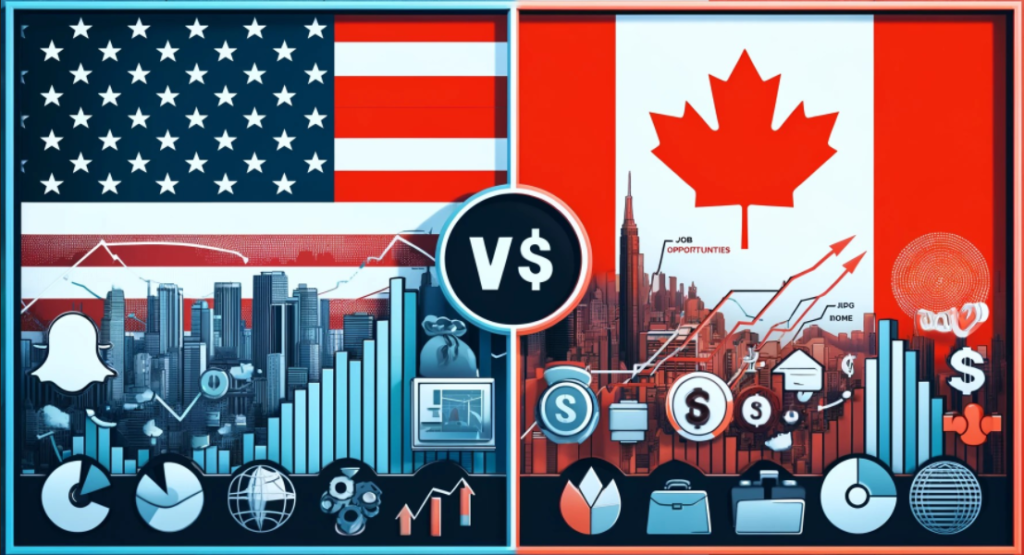Canada’s personal income tax system plays a pivotal role in supporting the country’s infrastructure, funding essential services like health care, public education, and defense. With a graduated tax regime, individuals contribute based on their earnings, ensuring a fair distribution of the tax burden. As employers deduct taxes directly from earnings, understanding your obligations and learning about tax credits, deductions, and rates becomes imperative. This knowledge not only aids in compliance but also empowers Canadians to manage their finances effectively.
This guide delves into the intricacies of personal income tax in Canada, including the CRA’s role in tax collection and the various tax brackets that determine how much citizens pay. From outlining the essential tax forms to navigating the tax preparation process, and understanding provincial taxes, we lay down a comprehensive road map for both filing and optimizing your returns. Armed with insights on deadlines, penalties, and effective tax planning, Canadians are better positioned to navigate tax season efficiently. Additionally, highlighting the expertise of professional tax accountants like BOMCAS Canada underscores the importance of specialized guidance in managing personal income tax services across the nation.
Understanding Canadian Income Tax System
The Canadian income tax system is overseen by the Canada Revenue Agency (CRA), which is responsible for collecting taxes and ensuring compliance with the tax laws. The system is primarily a self-assessment regime, where taxpayers are responsible for accurately reporting their income and calculating their tax liabilities. This structure is rooted in the constitutional authority outlined in the Constitution Act of 1867, which delineates federal and provincial powers regarding taxation.
Canada employs a progressive tax system with multiple tax brackets, ensuring that individuals pay an increasing rate as their income rises. There are five federal tax brackets, with rates ranging from 15% to 33%. This graduated system is designed to equitably distribute the tax burden among Canadians based on their ability to pay. Additionally, most provinces and territories in Canada also apply their own tax rates, which vary and are administered in conjunction with the federal taxes.
The income considered taxable under this system includes earnings from employment, self-employment, certain investments, and pensions, among others. However, some sources of income, like lottery winnings and gifts, are exempt from taxation. For residents, the tax system encompasses global income, whereas non-residents are taxed only on their income originating from Canadian sources. Each year, individuals must file a tax return with the CRA to report their income and claim any eligible deductions or credits, which can significantly affect the amount of tax owed or result in a refund.
Who Needs to File a Personal Income Tax Return?
In Canada, the obligation to file a personal income tax return extends beyond just the residents to include non-residents and deemed residents, contingent upon specific criteria such as earning income from Canadian sources or residing in Canada for tax purposes. This comprehensive requirement ensures that all individuals who engage economically within the country contribute appropriately to the national revenue.
Key Criteria for Filing a Tax Return
- Residency and Income Sources: Both residents and non-residents must file a return if they owe tax to the CRA or have earned income in Canada.
- Self-Employment and Premiums: Individuals who are self-employed are required to file a tax return to account for CPP and EI premiums.
- Pension and Benefit Adjustments: Those wishing to split pension income with a spouse or needing to make repayments to plans such as the Home Buyers’ Plan (HBP) or the Lifelong Learning Plan (LLP) need to file.
- Capital Property Transactions: Reporting is required for anyone who has disposed of capital property during the tax year.
- Benefit Repayment Obligations: Tax returns are necessary for those who must repay any part of their Old Age Security or employment insurance benefits.
- Receiving Benefits: Individuals receiving advance payments from the Canada Workers Benefit (CWB) or other similar benefits must file to remain compliant and possibly eligible for future benefits.
- CRA Requests: Compliance with any direct request from the CRA to file a tax return is mandatory.
- Claiming Deductions and Credits: Filing a tax return is crucial for anyone looking to claim tax deductions or credits, which can significantly reduce the amount of tax payable.
Special Considerations
- International Students and Non-Resident Filers: International students and other non-residents must file a tax return if they have received income in Canada, including scholarships, bursaries, or fellowships.
- Deceased Estates: Legal representatives handling the estate of a deceased person are required to file a tax return on their behalf, ensuring all final tax obligations are met.
This detailed filing requirement framework supports the Canadian tax system’s integrity, ensuring that all eligible parties contribute to and benefit from the system equitably. BOMCAS Canada, with its expertise in personal income tax services, stands ready to assist clients across the nation in navigating these complexities, ensuring compliance and optimizing tax returns for all Canadians.
Income Tax Rates in Canada
In Canada, the federal income tax rates for the year 2023 are structured progressively to ensure fair taxation based on the income level of individuals. The rates are set as follows: a 15% tax on the first $53,359 of taxable income, followed by 20.5% on the next $53,358 (ranging from $53,359 to $106,717). For the subsequent income bracket, 26% is levied on the next $58,713 (from $106,717 to $165,430). As income increases, the rate rises to 29% on the next $70,245 (from $165,430 to $235,675), and finally, any income exceeding $235,675 is taxed at 33%.
Additionally, residents of Canada or those who have earned income within any province or territory are also subject to provincial or territorial income taxes. These taxes vary significantly across different jurisdictions but are applied in conjunction with the federal taxes to comprehensively cover the tax liabilities of individuals. The highest provincial or territorial tax rates and surtaxes also differ, reflecting the unique fiscal needs and policies of each region.
For the upcoming year, 2024, the federal tax brackets have been adjusted slightly. The new rates will apply 15% to the first $49,020 of taxable income, then 20.5% on income over $49,020 up to $98,040. The next bracket covers income over $98,040 up to $151,978, taxed at 26%, followed by 29% on income over $151,978 up to $216,511. Finally, any income exceeding $216,511 will be taxed at a rate of 33%. These adjustments ensure that the tax system remains responsive to economic conditions and inflation, maintaining fairness and efficiency in tax collection.
The federal basic personal amount—which is the non-taxable threshold below which no tax is levied—also sees an annual adjustment. For 2023, this amount ranges between $13,520 and $15,000, ensuring that low-income earners are shielded from federal income taxation up to this threshold. In 2024, it is projected to increase to between $14,156 and $15,705, thereby adjusting for economic factors and providing slight relief from taxation. This basic personal amount plays a crucial role in the progressive nature of Canada’s tax system, ensuring that those with minimal economic means face less tax burden relative to their income.
Provincial and Territorial Taxes
In Canada, the administration of individual income taxes is a collaborative effort between the federal government and the provincial or territorial governments, with the notable exception of Quebec. The Canada Revenue Agency (CRA) plays a central role in collecting and administering these taxes on behalf of the provinces and territories. Each jurisdiction maintains its own distinct tax laws and policies, reflecting the diverse economic landscapes and fiscal needs across the country.
Taxpayers in Canada are required to calculate and pay provincial or territorial income tax in addition to their federal income tax obligations. This dual-level taxation ensures that provinces and territories have the necessary funds to manage local services and infrastructure projects. Additionally, residents may benefit from provincial or territorial credits, which are designed to complement the federal credits and provide further financial relief.
The table below outlines the various sales tax rates across Canada, which include Goods and Services Tax (GST), Harmonized Sales Tax (HST), Provincial Sales Tax (PST), and Quebec Sales Tax (QST). These rates vary significantly depending on the province or territory, illustrating the localized approach to taxation within the country:
| Province/Territory | GST (%) | PST (%) | HST (%) | QST (%) |
|---|---|---|---|---|
| Alberta | 5 | N/A | N/A | N/A |
| British Columbia | 5 | 7 | N/A | N/A |
| Manitoba | 5 | 7 | N/A | N/A |
| New Brunswick | N/A | N/A | 15 | N/A |
| Newfoundland and Labrador | N/A | N/A | 15 | N/A |
| Northwest Territories | 5 | N/A | N/A | N/A |
| Nova Scotia | N/A | N/A | 15 | N/A |
| Nunavut | 5 | N/A | N/A | N/A |
| Ontario | N/A | N/A | 13 | N/A |
| Prince Edward Island | N/A | N/A | 15 | N/A |
| Quebec | 5 | N/A | N/A | 9.975 |
| Saskatchewan | 5 | 6 | N/A | N/A |
| Yukon | 5 | N/A | N/A | N/A |
This detailed approach to taxation ensures that all residents contribute to their local economies while also receiving tailored benefits and services. BOMCAS Canada, renowned for its expertise in personal income tax services, assists clients across the nation in navigating these complex tax landscapes, ensuring compliance and optimizing tax returns to leverage both federal and provincial or territorial tax advantages.
Taxable Income and Deductions
Taxable income in Canada encompasses a wide array of earnings, from employment wages to investment gains, all of which are subject to federal and provincial taxes. Understanding what constitutes taxable income is crucial for accurate tax reporting and compliance. Employment income includes regular salaries, benefits such as security options and a company car, and even income from emergency services volunteering. Additionally, investment income like interests, dividends, and capital gains are considered taxable. Notably, while investment income in Tax-Free Savings Accounts (TFSAs) is sheltered, withdrawals from Registered Retirement Savings Plans (RRSPs) are taxable in the year they are made.
Deductions and tax credits serve as vital tools for reducing taxable income, thereby lowering the overall tax liability. Canadian taxpayers can claim a variety of deductions such as RRSP contributions, union dues, and professional fees, along with moving expenses if relocating for work or education. Tax credits are available for a range of circumstances including charitable donations, medical expenses, and for supporting dependents with disabilities. Particularly, the Principal Residence Exemption allows for the exclusion of capital gains from the sale of one’s primary home, providing significant tax relief.
For those looking to optimize their tax returns, BOMCAS Canada offers expert personal income tax services, guiding clients through the complexities of deductions and credits to ensure they achieve the maximum possible tax advantage. Their professionals are adept at navigating the nuances of the Canadian tax system, helping taxpayers to not only comply with the law but also to benefit from all applicable tax-saving opportunities.
Tax Credits and Benefits
In Canada, the tax system is designed to alleviate the financial burden on its citizens through various tax credits and benefits, ensuring a fair distribution of the tax load. Non-refundable tax credits, which reduce the amount of tax payable, cover a broad spectrum including the basic personal amount, dependents, CPP/QPP contributions, EI premiums, disabilities, tuition, education, and medical expenses. For charitable donations, the system is particularly generous, offering a credit at the lowest tax rate for the first $200, and at the highest rate for any amount exceeding that threshold. Additionally, to prevent double taxation of income, credits such as the dividend tax credit and the foreign tax credit are available.
Canada’s approach extends to specific demographics and situations to further support its residents. For instance, the Canada Child Benefit (CCB) provides a monthly payment to eligible families with children under 18, helping to cover the costs of raising children. Similarly, the GST/HST Credit issues quarterly payments to individuals with low and modest incomes, aiding in offsetting the general sales tax and harmonized sales tax they pay throughout the year. For families without access to private dental plans, the Canada Dental Benefit offers interim financial support for children under 12, ensuring essential dental care.
Moreover, the government acknowledges the unique challenges faced by Canadians with disabilities through the Disability Tax Credit (DTC), which provides significant tax relief to those with severe impairments. The Canada Workers Benefit and the Canada Training Credit are examples of how the system encourages and supports continuous employment and skills development among low-income workers. These targeted benefits not only provide immediate financial relief but also promote long-term economic participation and stability. BOMCAS Canada, with its expertise in personal tax services, plays a crucial role in helping Canadians navigate these benefits to optimize their tax returns and enhance their financial well-being.
How to File Your Taxes in Canada
To ensure compliance and optimize returns, Canadian taxpayers should familiarize themselves with the various ways to file taxes and the key dates for the tax year 2023. One can file taxes using NETFILE-certified tax software, which allows electronic submissions directly to the CRA. For those preferring personal assistance, employing a tax preparer who uses EFILE-certified software is beneficial. Community volunteer tax clinics are available for eligible individuals, and for simpler tax situations, filing a paper tax return or using SimpleFile by phone (by invitation only) are viable options.
The tax filing process commences on February 19, 2024, with the deadline for submission set on April 30, 2024. For self-employed individuals or those whose spouse or common-law partner is self-employed, the deadline extends to June 17, 2024, considering June 15 falls on a Saturday. It’s crucial to note that all taxes owed must also be paid by April 30, 2024, to avoid penalties. Taxpayers should ensure all income sources are reported, including employment, self-employment, foreign investments, and other earnings. It’s equally important to claim all eligible deductions, credits, and expenses to reduce taxable income. Essential tax slips such as T4 and T4A must be gathered to support the filings.
For efficient processing and quicker refunds, keeping CRA information current is imperative. Changes in address, phone number, name, or marital status should be promptly updated. Registering for direct deposit is recommended to expedite the receipt of payments and refunds. After filing, taxpayers receive a notice of assessment and can check the status of their refunds or make necessary adjustments to their returns. BOMCAS Canada, renowned for its professional tax accounting services, assists clients across the country in navigating these processes, ensuring accuracy and maximizing tax benefits.
Deadlines and Penalties
For Canadian taxpayers, adhering to deadlines is crucial to avoid the imposition of penalties and interest on unpaid taxes. The primary deadline for filing individual tax returns is set for April 30 each year. If this date falls on a weekend or a public holiday, the deadline is extended to the next business day. This flexibility ensures that taxpayers have every opportunity to meet their obligations without penalty.
For self-employed individuals and their spouses or common-law partners, the filing deadline extends to June 15. This extension acknowledges the additional complexities often involved in self-employed tax situations. However, it’s important to note that any taxes owed must still be paid by April 30 to avoid interest charges, which begin accruing on May 1. The Canada Revenue Agency (CRA) applies compound daily interest on any outstanding balance, with the rate subject to change every three months.
Failure to file by these deadlines results in a late-filing penalty. The penalty starts at 5% of the balance owing, plus an additional 1% for each full month the return is late, up to a maximum of 12 months. For those who have been penalized in previous years, the charges can be even more severe. If the CRA had to issue a formal demand for a return in any of the three preceding years, the penalty for late filing increases to 10% of the balance owing, plus 2% for each full month the return is late, up to a maximum of 20 months.
In circumstances beyond one’s control, taxpayers have the option to request the CRA to waive or cancel penalties or interest. This provision is designed to accommodate taxpayers who face genuine hardships that prevent them from meeting their tax obligations.
Planning and Tips for Tax Season
Utilizing Tax-Advantaged Accounts
To optimize tax returns, Canadians should consider taking full advantage of tax-deferred and tax-free accounts. Contributing to a Registered Retirement Savings Plan (RRSP) allows individuals to reduce their taxable income, with taxes only applicable upon withdrawal. Moreover, investments within a Tax-Free Savings Account (TFSA) accrue interest, dividends, or capital gains without being subject to tax, with the 2023 contribution limit set at $6,500. For families, the Registered Education Savings Plan (RESP) offers tax-free growth, and withdrawals are taxed in the hands of the recipient, usually at a lower rate.
Strategic Income Management
Income splitting is an effective strategy to lower overall tax liability. By splitting pension income with a spouse, the higher income earner can transfer up to 50% of their pension to their spouse, which may be taxed at a lower rate. Additionally, contributions to a Spousal RRSP can also help in reducing the couple’s combined tax burden, as the contribution results in a tax deduction for the higher earner, while withdrawals are taxed at the lower earner’s rate.
Expert Assistance from BOMCAS
Engaging with professional tax accountants like BOMCAS Canada can significantly ease the complexity of tax planning and filing. BOMCAS professionals are not only well-versed in Canadian tax laws and regulations but also offer personalized services tailored to individual financial circumstances. This can lead to substantial tax savings by identifying optimal deductions and credits while ensuring compliance with the latest tax changes and improvements. BOMCAS’s expertise is particularly beneficial in handling intricate aspects of tax management, providing peace of mind and freeing up valuable time for their clients.
These strategies and tips are designed to assist Canadians in navigating the tax season more effectively, ensuring they maximize their returns and adhere to tax regulations efficiently.
Why Choose A professional Tax Accountants like BOMCAS for Personal Tax Services
BOMCAS Canada stands as a beacon of professional tax and accounting services across the nation, offering a comprehensive suite of services tailored to meet the needs of both individuals and corporations. Their expertise extends beyond simple tax preparation; they provide detailed financial planning and bookkeeping services designed to enhance business operations and financial clarity. Clients benefit from BOMCAS’s ability to handle complex payroll systems, ensuring accurate and timely payment of workers, which is crucial for maintaining business stability and employee satisfaction.
Moreover, BOMCAS’s role in supporting non-profit organizations through specialized tax filing services helps these entities stay compliant with Canadian tax laws. This is particularly vital for non-profits that must adhere to specific financial regulations to maintain their status and funding. BOMCAS’s ability to navigate these intricate requirements makes them a valuable partner for non-profit entities looking to focus on their core mission without the added burden of tax compliance issues.
The firm’s dedication to providing top-tier service is reflected in the positive feedback from their clientele. One client highlighted, “They are one of the Best Accounting and Tax Services in Edmonton Alberta. I would recommend anyone or any corporation to get their Bookkeeping done here and their Personal Income Tax Preparation and Filing and Corporation Taxes done here”. This client testimony underscores BOMCAS’s commitment to excellence and their role as a trusted advisor in the financial and tax planning landscape.
Conclusion
Navigating the complexities of Canada’s personal income tax system demands not only a detailed understanding of the tax laws and requirements but also a strategic approach to maximize returns and minimize liabilities. This guide has traversed the landscape of tax brackets, deductions, credits, and essential compliance tips to provide Canadians with the knowledge needed to effectively manage their taxes. From understanding the fundamental principles underpinning the tax system to the intricacies of filing requirements and the strategic use of tax-advantaged accounts, we’ve emphasized the importance of staying informed and proactive in tax planning. BOMCAS Canada, as Canada’s Professional Tax Accountants, offers personalized income tax services that cater to the unique needs of clients across the nation, ensuring optimized returns and compliance with the law.
As the tax season approaches, the role of expert tax accountants becomes increasingly critical to navigate the ever-evolving tax landscape and leverage opportunities for tax savings. Reflecting on the broader implications, it’s clear that effective tax management not only benefits the individual taxpayer but also contributes to the economic well-being of the country as a whole by supporting critical public services and infrastructure. Contact BOMCAS Canada Today for all your Accounting and Tax needs, leveraging their expertise to ensure your tax affairs are in order, and you’re taking full advantage of every opportunity to optimize your financial health.









